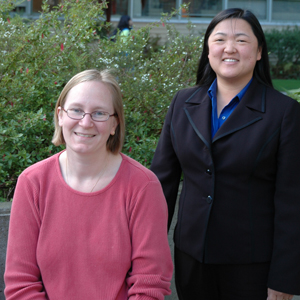Preventing youth obesity and depression with smartphones
March
3,
2010 -- Can
texting and snapping photos with a smartphone change the lives of youth
trying to avoid obesity and depression? Health Equity Institute (HEI)
and Communications Studies researchers are about to find out.

SF State researchers Christina Sabee and Katherine Kim.
Biology Professor in Residence at SF State’s HEI, Katherine Kim, and Assistant Professor of Communication Studies Christina Sabee are co-investigators on a two-year study to test the use of smartphones to manage the food choices and physical activity of 100 overweight teens from low-income neighborhoods in San Francisco. The study, funded with $480,000 from the Robert Wood Johnson Foundation's Project HealthDesign, will focus on youth who are at risk of depression and are being treated for weight issues at a San Francisco clinic.
The study was developed by Kim and colleagues at San Francisco General Hospital's Family Health Clinic. Kim will oversee development of the system and analyze the usefulness of technology to improve health. Sabee, whose research focuses on uses of the Internet, will study the way the process impacts patient and provider communication.
Patients selected for the study will capture information relevant to their health goals, such as snapshots of the food they are eating, their social networks and other things not typically shared with doctors. The information recorded daily by patients on their phones will be entered on a secure Web site. Researchers, clinicians and patients will be able to monitor the daily observations, but patient confidentiality will be observed.
"This work will put the control of health decisions in the patients' hands and will extend the support of the clinicians beyond the clinic's boundaries," Kim said. "We also hope that the patients will become more aware and responsible for their own health."
According to a study published in the Journal of the American Medical Association, the number of overweight children ages 6 to 11 jumped from 7 to 19 percent between a 1980 investigation and 2003. The percentage of overweight adolescents ages 12 to 19 tripled from 5 percent to 17 percent. The federal government has since set a national goal to lower these percentages.
"I am delighted to see this project move forward," said Cynthia Gomez, director of the Health Equity Institute. "It has the potential to make meaningful changes in the lives of people who are typically underserved by the health care system, and it is a perfect example of the kind of collaborative, inventive and innovative research we conduct at the HEI."
The HEI team is one of five from universities across the U.S. selected to explore how patient-recorded observations of daily living can improve the treatment of chronic medical problems. These studies are part of Project HealthDesign: Rethinking the Power and Potential of Personal Health Records, a national program developed by the Robert Wood Johnson Foundation to explore how personal technology can help people become more informed patients and better consumers of health care. Kim and her team will provide frequent updates about their work through the Project HealthDesign blog and other interactive features.
For more information about Project HealthDesign, or to read the blogs, visit the Project HealthDesign Web site.
Share this story:
